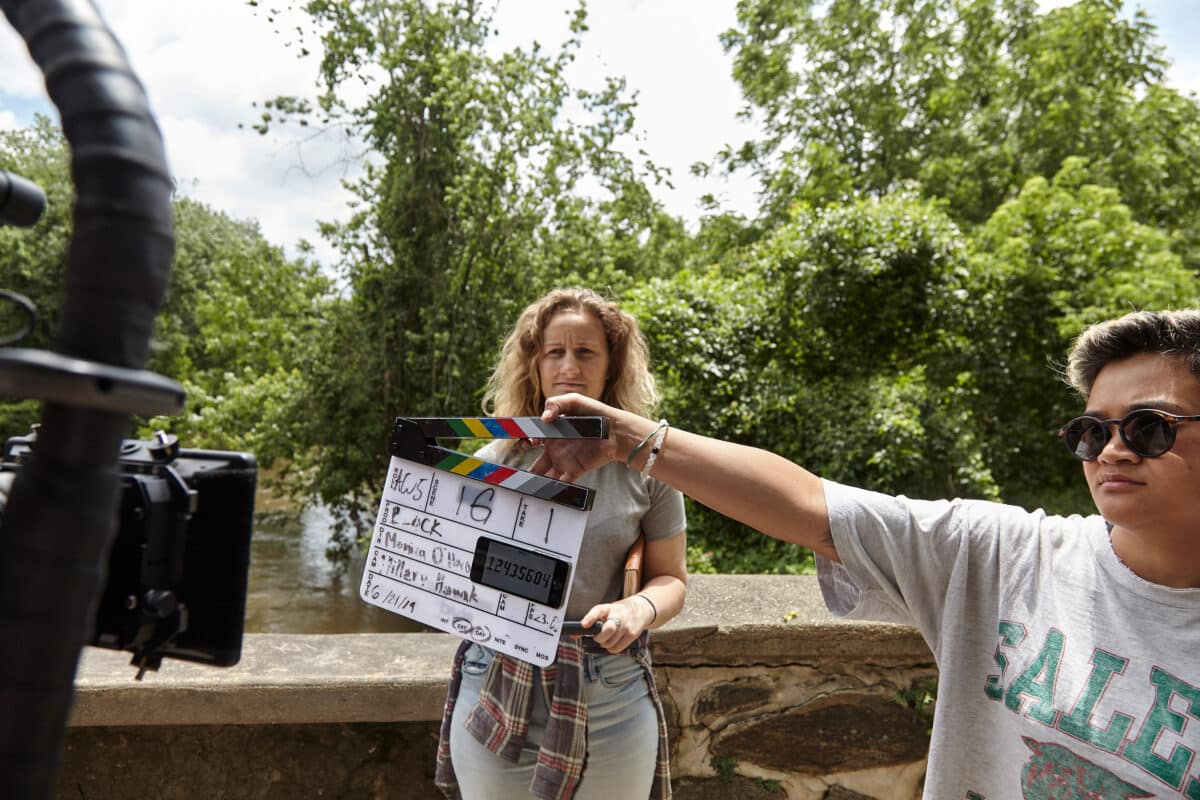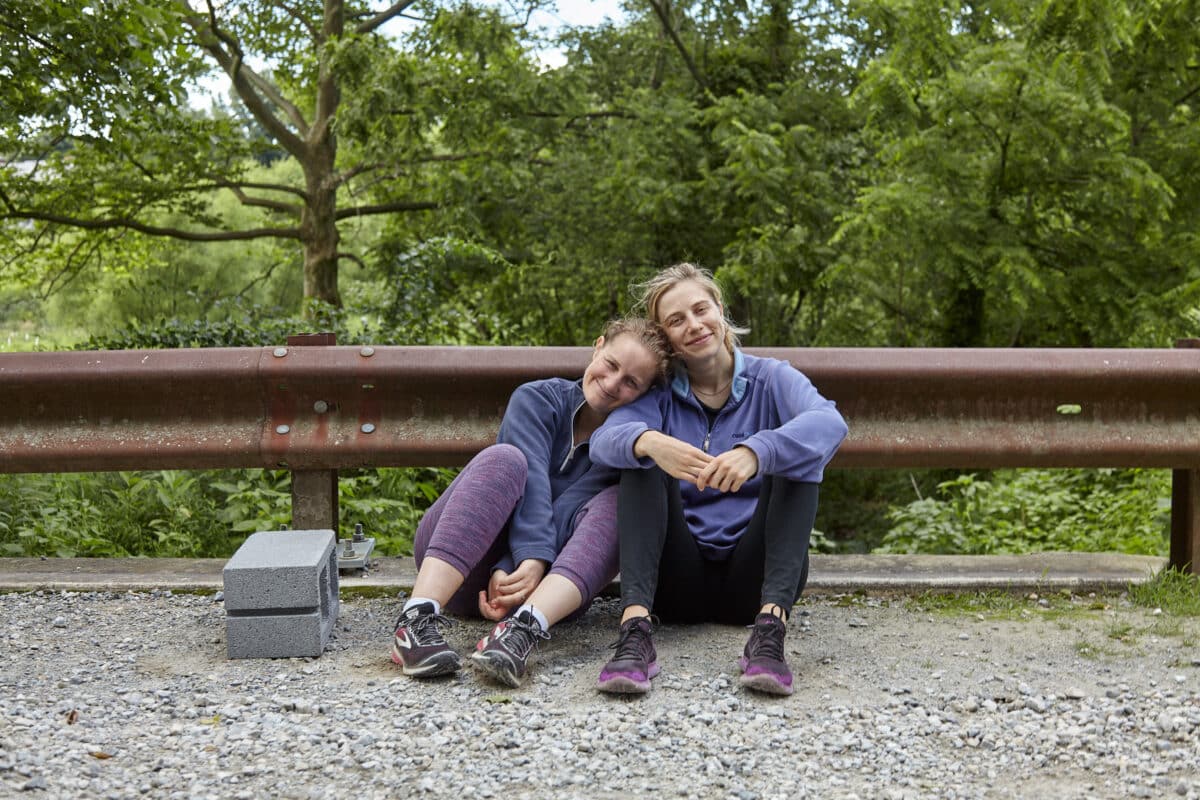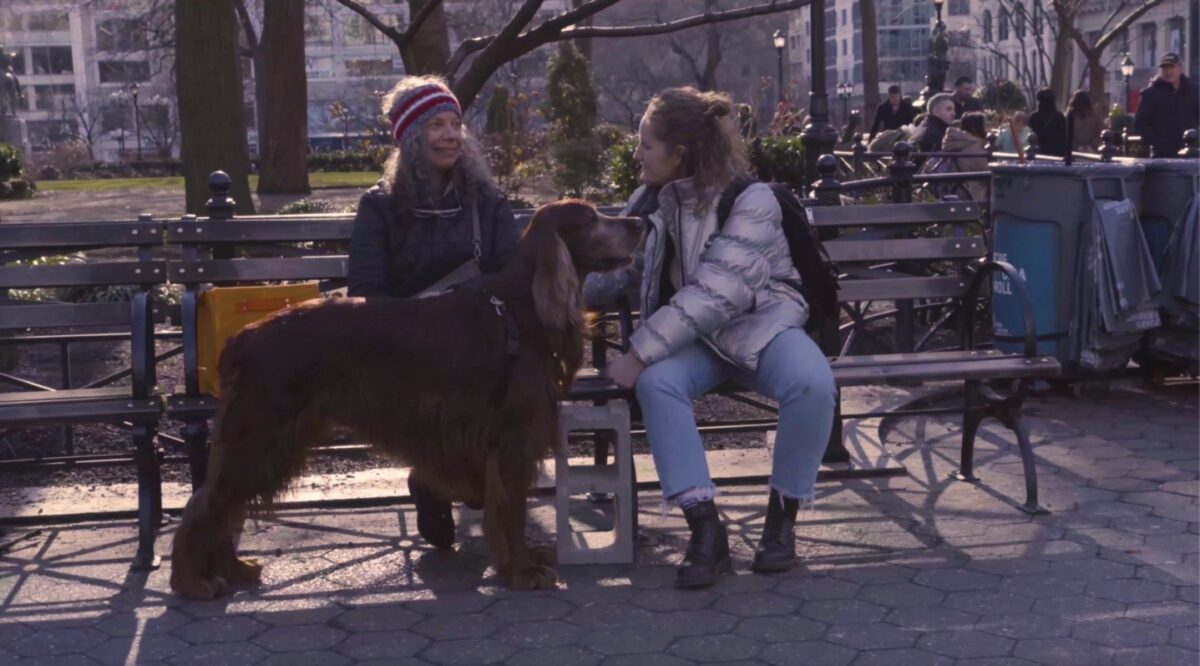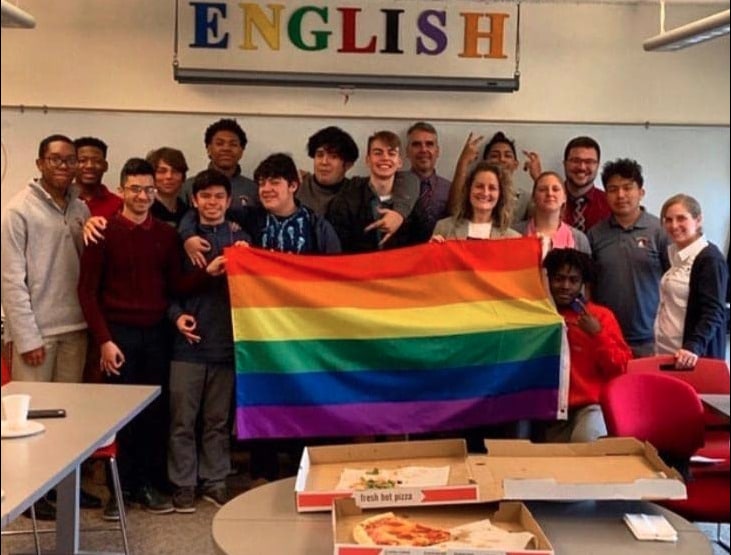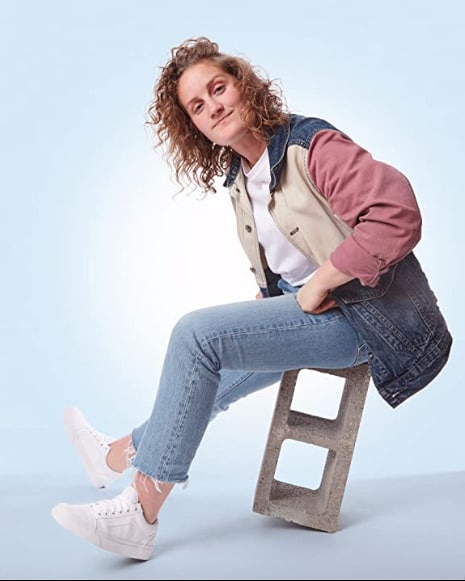
Carrie Brennan is a filmmaker working in New York and Philadelphia, who got her start exploring stand-up, but her chops in storytelling through writing, acting, and producing her own experiences. Carrie’s golden rule is to tell the truth and in doing so, model its possibilities for those who struggle to find their own. This month on Project Forte we look to LGBTQ+ stories, of which Carrie is a valiant protector, and the parade couldn’t have come at a better time! This community has experienced many evolutions of persecution and Carrie reminds us all that we can be proud of the progress seen today, while constantly pushing forward. Her message is one of hope for all communities to feel safe in their expression, their identities, and their future.
Written and Edited by Kate Feher
__________________________________________________________________________________________________________________________
Carrie Brennan: My name’s Carrie Brennan. I go by the pronouns she/her, and I was the writer, producer, and actor for Block, the film.
Kris Mendoza: Could you tease Block a little bit, talk a little about the project? What did you set out to do and where are you now with it? It seems like you’re premiering in two weeks!
Carrie Brennan: Yeah! Okay – I will try to be succinct with this, just give me a hand if we move onto hour two. [jokes] But anyway, so Block is a coming-out LGBTQ story that I wrote. It’s a 43 minute featurette, and the mission for this story is to inspire people to see the best in themselves and to love themselves.
Kris Mendoza: Oh, I didn’t realize it was that long. Nice.
Carrie Brennan: Yeah. Yeah. I wrote it about my life, my experience coming out of the closet, but really, it’s just a story about what it means to struggle with something that other people might not know about and the good stuff that comes from loving yourself and expressing your truth. I wrote it in 2016 as I was coming out, writing as I experienced, and then we filmed in 2019. Classic indie post-production took a year, which led us up to 2020. Like I said, the mission of the film was always to bring it to the people. Of course I always wanted to do the film festival route, but also bring it to therapist organizations, schools, high schools, parent/teacher meetings, places like that – grassroots stuff. We had a pretty nice lineup planned to target that for 2020, and then COVID happened. So, we put a pause on everything and instead, put together a virtual premiere in March of 2021. We just thought at that point, the community had been suffering and needed it. We hadn’t had our people together in so long that it just came down to – we want the people to have this story now.
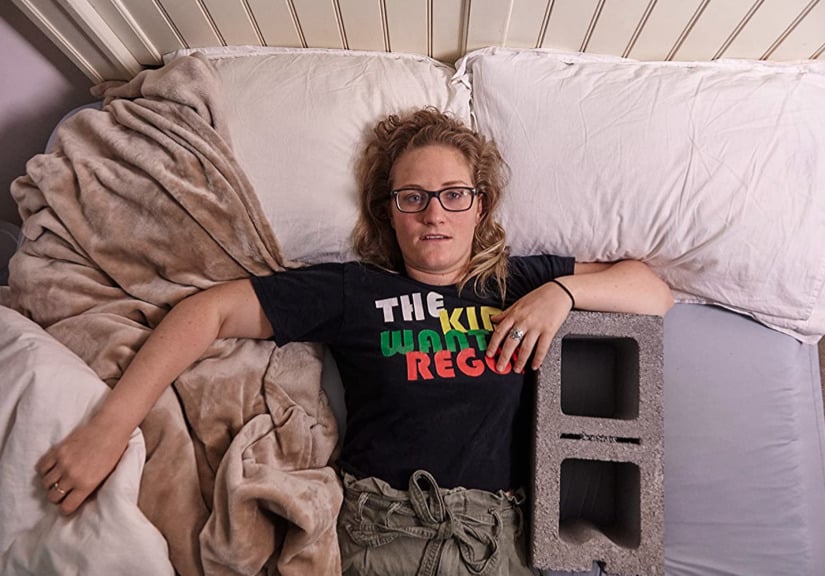
We are actually hosting our first in person premiere this Pride month on june 22nd! We’re going to show the film, followed by a Q&A with the cast and crew, and we’ve got a DJ lined up as well, so we can kick off pride and dance the night away.
Kris Mendoza: And where can people buy tickets, or is it open to the public?
Carrie Brennan: Yeah, absolutely. Absolutely. Tickets are on sale! Blockthefilm.com/tickets, and It’s on our Instagram Bio. I’m just really grateful that you gave me the opportunity to talk about a thing that I love. I love this stuff so much –
Kris Mendoza: I can feel it! I feel the passion coming out… It’s infectious! So now, tell us how you got started in this crazy industry?
Carrie Brennan: Good question. I started off wanting to do stand-up comedy, actually. I quit business school my sophomore year of college and did a bunch of stand-up around the philly area- just hustling to as many open mics and student films as I could. I was out in California for a little bit, graduated college, and then went to an acting school called Playhouse West Philadelphia, and that’s when I fell in love with storytelling. It really kicked off from there and I started studying the craft of acting and just really fell in love with the production process and what stories could do to people… how it could make a difference in their lives..
Kris Mendoza: And you are a champion of telling LGBTQ+ stories! Can you tell me a little bit about why and how you’ve made that your mission?
Carrie Brennan: I think that my specificity comes from having experienced the pain of living in the closet, and the sense of realization and security that I felt from seeing people that reflected who I truly was on screen. When I was in 7th grade, I sort of started getting inklings that I might be gay, and with that realization came SO much anxiety. And terror. And fear – fear for mostly, what is my life going to look like? I couldn’t see a future for myself. I felt so trapped by this thing that I never asked for or wanted, and felt like there was no way out, really. Until one day, I saw these two characters on Grey’s Anatomy finally understanding their love for each other . And it was so visceral for me, because not only were they gay characters, but there was a woman on screen who looked like me. Blonde, blue eyes, long hair… I had never seen a lesbian that was feminine before. I just about spit my drink out. And in retrospect, that’s really the power of showing characters on screen who truly express how beautiful and diverse our world is. Right? So really, that changed my life. That was the first time that I realized I could be okay. I mean, I didn’t come out for like 10, 15 years, but I always had that example. It was this thing that I carried with me. I was just really moved by it, honestly, and so, when I did eventually come out at 23, I wanted to just tell stories that would inspire people like I was inspired in seventh grade. I think that’s where it comes from – wanting to tell the truth.
Kris Mendoza: That’s amazing, in terms of seeing something of yourself on screen. Just last month we were talking to a lot of Asian American filmmakers and, yeah, we didn’t have a lot of role models ourselves. To find a handful at that age like on Grey’s Anatomy… And if I remember correctly, she wasn’t a lesbian in the beginning of the show, right? She came out halfway through, so it’s incredible that her character was given the safe space to realize a fuller, more honest version of herself and to be celebrated for it. For that to be depicted on screen for someone in grade school to see as, I would say normalized, right? It’s probably very empowering and validating.
Carrie Brennan: Yeah. And actually, you hit on something so important, which was not just a gay couple, but a lesbian couple that looked like me in a way that modelled a future for myself. Because in seventh grade, I couldn’t picture a future for myself past 30.
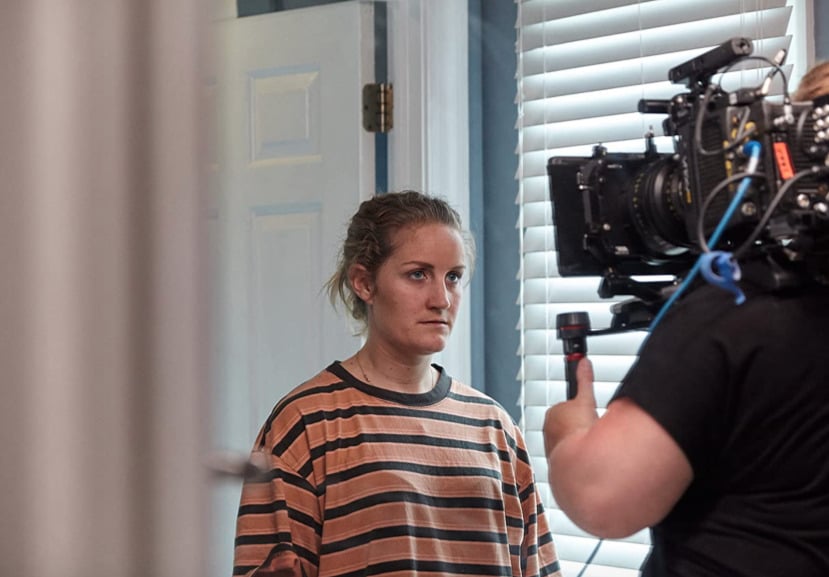
I remember my friends wanting to go to a fortune teller in that year – This is such a random thought – but I wouldn’t go because I was so scared on a very deep level that the fortune teller would say, “Oh, apparently reading your palm, you’re going to be gay. You’re going to marry a woman and you’re going to have this number of kids.”
Kris Mendoza: Haha, You didn’t want them to be there for that.
Carrie Brennan: Yeah, exactly. I’d be like ohhh no I wasn’t ready for that, but that’s why it’s so important not only to have LGBTQ films, but make those films with LGBTQ+ characters who are not just white. It’s not enough to just to make a white male lead gay in a script, and call it a day. We’ve got to create LGBTQ+ films that actually represent what we actually are, and how diverse and beautiful our community really IS.
Kris Mendoza: Absolutely. Can you talk about why it is so important that folks within the LGBTQ community be the ones harboring this narrative and telling it themselves as opposed to people who aren’t in the community?
Carrie Brennan: I think the best storytelling hinges on telling the truth – the ugly, messy, embarrassing, vulnerable truth. It’s not to say that straight people can’t tell LGBTQ+ stories, but what’s the intention behind it? Are you trying to check a box? Are you trying to be “good?” What about this story is personal and important to you? Why do you really want to tell it?
I’ve met straight people who have told incredible LGBTQ+ stories, and straight people that have absolutely butchered LGBTQ+ stories and hurt people along the way. It’s so delicate because these are people’s lives you’re dealing with. Just as much power as responsibility, or whatever that spider man quote is…but the people who work on LGBTQ+ films and do a great job always have some sort of very very deep personal connection to the struggle, or the celebration, or the community. Without it, there’s no motor.
Kris Mendoza: Absolutely. Can you tell me a little about your personal work? What are you most passionate about in terms of approaching a project, collaborating with people, and sharing it with the world?
Carrie Brennan: I love writing slice of life LGBTQ+ stories that ultimately inspire people to see the best in themselves. That is my motor, that’s my north. I’ve always erred on the side of writing from my own experience or from stuff that has happened in my life too..
Kris Mendoza: You write what you know.
Carrie Brennan: Yeah! Exactly. And I’m really inspired by slice of life movies. I love when everyday things are cinematic like, for instance the shows Fleabag and Broad City. You get to open up someone’s brain and see, “Oh yeah, this is what’s going on” and recognize how relatable it is to your own experience.
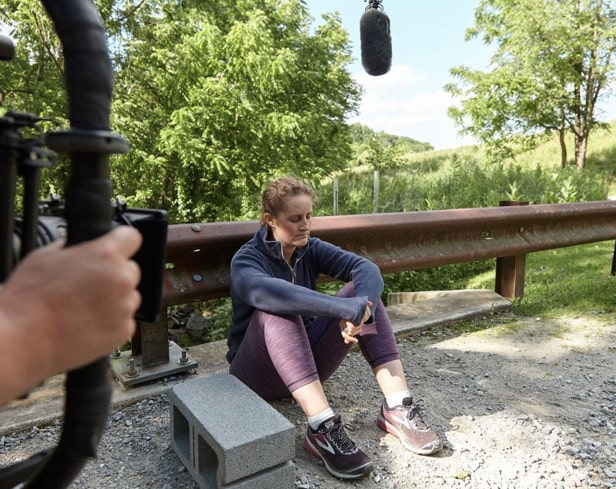
How I choose movies and projects usually goes like… If I know in my gut it’s something that will inspire people to see the best in themselves and love themselves and it’s queer and it’s personal, AND got a great crew, then I know it’s something that I’m going to work really hard on because I care about it.
Kris Mendoza: I don’t know if it’s happenstance, but it seems intentional that you choose to work with.. not only other LGBTQ people but a lot of… well, the most women I’ve seen on a cast and crew, which is just amazing for a project. What are your thoughts on the current representation you see in this industry, not just behind the camera, but also in front, as a producer, writer, and actor? You see both sides of it.
Carrie Brennan: I think we’re “good, getting better.” I think the progress that we’ve seen in the past, even just two years, is good. I have definitely had more people asking for female crew members specifically, which is great. But I have friends directing commercials who are still, 9 times out of 10, the only women on set of more than 100 people. I think the biggest room for growth is the intention behind WHY we want to see more women on set. I think real progress will be made when people realize that certain stories are actually meant to be told by a woman not to check a box, but because the female eye might elevate the story.
Monica [O’Hara] and I wanted women on our crew because it was the best way to tell this story. We found our crew naturally. These people were in our lives and as I would tell them about this project they’d come on board saying, “this is something that I resonate with on a personal level, on an emotional level.” I would meet with a friend, and she might tell me about going through this really tough time – so I’d share – “Here’s what I’m trying to do with this story.” Those interactions came from the heart. Those women shared emotions or feelings about it, and it just came together that way.
Kris Mendoza: I definitely stalked you prior to this interview, and you posted recently about your aunt in terms of… I don’t want to take your story away from you, but in terms of someone who helped navigate and help you find a community. I think you said when you were seven she was going to… well, she knew she needed to be around for you at a certain point in your life. Unfortunately, I think there are some people that don’t have someone like that in their family or a role model at all, so can you talk to me about this person being, not only a family member, but also just being someone who helped you navigate that part of your life?
Carrie Brennan: I love that you saw the pride people story. I think that’s awesome. Growing up, it was always just “Aunt Mary Ellen and Amy” – my family wasn’t so pride-forward in the sense that we were marching in parades, but it was what it was. I think towards the later years, I knew, in a way – on a very deep level, that she knew, and I was like, “I think she’s on to me.” She would ask me things like, “Oh, anyone new in your life?” instead of saying, “So, any guys-
Kris Mendoza: Do you have a boyfriend? Yeah.
Carrie Brennan: Yeah. So on this very deep level, I was like, “Oh my God, she knows.” And I didn’t even really know at that time. There was a consonance. It showed me the importance of having a role model who is not only like you, but also who has a loving relationship themselves and normal ups and downs like anyone else. I think you just need one person to show you that you’re not alone. It’s astronomical what it can do to a kid’s life. I think I would be a lot worse off had I not had my Aunt Mary Ellen and Uncle Paul to just show me the way without showing me the way… without saying, “Hey kid-
Kris Mendoza: “This is how you’re supposed to do it.”
Carrie Brennan: Yeah. And “I think you’re gay.” And when I did eventually come out to her, it was just a, “Great! amazing!” – such a positive thing. It was like, “now you’re going to be able to be a deeper level of yourself, a freer version, and I’m so excited for this and for you.” It was like a celebration versus a death. And that’s what I think scares so many people about coming out: they think all they know is this life, and it’s frightening to give all that up for a hope that it could be better. When you have someone to look up to, and just to know that hey, this is possible, it can make all the difference in the world.
Kris Mendoza: That’s empowering. So, you posted that she said, when you came out, “Pack your bags, you’re going to P-town?” What is P-town? What happens in P-town? I want to know!
Carrie Brennan: Yes! P-Town, it’s called Provincetown, P-Town for short. It’s just a very gay beach town. And they have this one event every year called Baby Dyke Weekend, and it’s where all the young lesbians come down for a beach weekend. It’s literally like Mardi Gras. It’s like gay Disneyland. At the time I was still living in West Chester and I didn’t really have many gay friends, and she just said, “Get your shit together. We’re going.
We’re doing this. We’re going to go down to the beach. I’m going to introduce you and to just get you into the community.” And it was amazing to just be surrounded by people that were like me. She knew from the time I was running around in my backyard as a kid -I had a snapback hat and my brother’s Jordan Jersey like a huge dress on me. She literally leaned over to her girlfriend and was like, “Someday, she may need us.” And her girlfriend was like, “Yeah, maybe.” And it was like this joke, but however many years later, it was true. And I always say, like, my mom gave birth to me, but my aunt gave birth to my soul. She’s like my soul mom.
Kris Mendoza: And this is your mom’s sister?
Carrie Brennan: Yeah. My mom’s sister.
Kris Mendoza: Yeah. How fitting!
Carrie Brennan: I know, right?
Kris Mendoza: Are there people in the film and television industry that are, whether they’re loud voices or not even in the LGBTQ scene, is there anyone who inspires you or you aspire to?
Carrie Brennan: Yeah. I would say off the bat, Abbi Jacobson and Ilana Glazer inspire me so much, even since I was in the closet during college. They’re the writer/ producer/actors who started this TV show called Broad City, which began as a web series. They just put it up on YouTube and the community grew from that seed. They didn’t have a lot, but they were so resourceful with the things that they had, and they paid people in pizza – like classic – just pulling stuff together to tell stories. They’re hysterical.
It was picked up by Comedy Central where they played larger than life versions of themselves and they just used what they had. They are role models to me in the sense that they work their asses off and they tell the truth. Abbi actually did an episode towards the later half of the series in which she came out, but she did it in such an off the nose way, talking about hats like, “I always thought you were a hat girl.” It was just so great the way they did it. I’m so inspired by them.
I’ve met Abbi a couple of times just in book signings and stuff like that. She is exactly who she is all the time. She doesn’t change for anyone, and I just think that’s really hard to do – especially when you have such a big following – to not lose yourself or get overwhelmed. It’s a dream of mine to work with her some day…of course gotta just throw that out there right into the universe.
Kris Mendoza: I don’t think people realize that this is not just on the LGBTQ side, but ethnically and gender-wise too. I’ve been talking to a lot of different folks who say, “I didn’t have anyone to look up to when I was younger in the industry,” or “I didn’t see myself in it.” Now they are, themselves, in the industry, realizing maybe it’s not just kids, it could be peers also who are looking to you for inspiration as a role model. It’s good that you’ve made it part of your mission, part of who you are.
So let me turn it around full circle here. You’ve been doing this for a little bit now, telling stories you’re passionate about, telling stories that you know, writing things that are near and dear to you. How often does it cross your mind, the responsibility or maybe privilege that you are a role model, not just for a young, aspiring filmmaker, but for any young person who may not know how to navigate this new part of their life?
Carrie Brennan: I think about it all the time. I think about it every day. I will stop when every kid born into this world no longer has to hide who they love or question their self-worth based on who they love. That’s where I’m at. Whether it’s 2020 or 2080, whatever. That’s my motor. That’s what keeps me up at night. That’s what I’m working for.
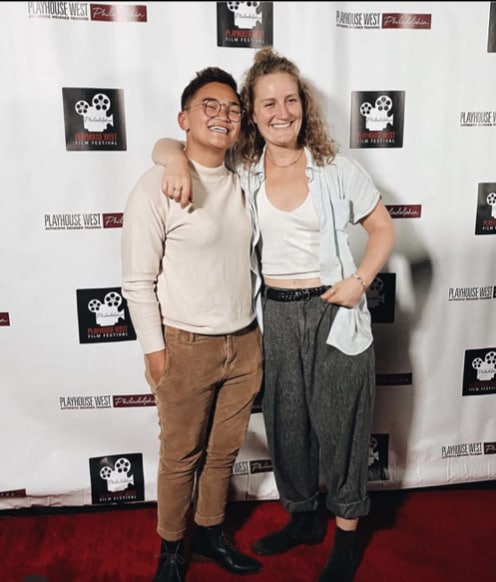
So, I feel really honored. I feel hella privileged. But I’m still trying to navigate it myself. It’s still a struggle for me. After I came out, I was like, “Oh, well, I’m good. I made Block. I’m not going to have any blocks in my life now.” And I remember my therapist laughing and being like, “Oh honey, you haven’t even started dating. Get ready.”
Kris Mendoza: Ha, that’s so great. I can sense your passion, your pride in finding yourself and moving on to help others. It’s inspiring for me, so what does this month mean to you? How have you seen it evolve and become more visible? Has it become a hallmark holiday?
Carrie Brennan: It’s definitely changed over the past few years, turning away from a corporate check about history. The coolest part about this pride is that it feels less like a season, like Christmas where we all see green and red for a while. It’s not like rainbows start shooting out of places just because it’s June. This year feels a btt different. like everyone is taking a second to understand the why of what we’re celebrating. That’s what’s made this pride month feel richer, in a way, because people are taking the time to learn about Stonewall and what people went through in order just to love, just to experience what it’s like to love without fear.
Kris Mendoza: Can I ask you why there’s a difference this year, in your opinion?
Carrie Brennan: I think a lot of it started with the Black Lives Matter movement last year. People were looking at their privilege and saying ” ok,There are other people here, and look how far ahead I am just because I’m White or just because I have money or just because I don’t look like this person.” There’s a deeper richness that comes from trying to unpack that and realizing the world isn’t just straight white men. There are a lot of layers to it and I’lll be the first to admit im on step 1 of a thousand ringed ladder though, but working towards it.
Kris Mendoza: I’m glad you made that connection because I’ve listened to a lot of diverse stories and there’s definitely a binding struggle. I do think Covid and quarantine brought a lot of people silence and the opportunity to question life and look for more meaning. Me Too, The Black Lives Matter, and Stop Asian Hate movements have all come to the surface in recent years, so that silence became a tipping point. I think that’s ultimately where we are, and I hope it’s just the beginning in terms of people being really intentional and conscious of it. The next step is what communities, companies, and politicians do about it.
Carrie Brennan: Yeah, that’s really what’s important. It’s a wild, wild west right now in all aspects of life, but we needed to shake things up so, so badly. 2019 was like… everyone was on a hamster wheel, refusing to slow down. It’s like trying to get someone’s attention, but the world was not stopping for anything. And then COVID hit and we were quarantined, with all the variables of life held still and it’s just like you’re floating in space, Right? We suddenly had time to look at what was really going on.
I think The point of understanding our history in pride month is not to shove it down people’s throats and not to show straight people that they’re bad.
The point of it is to say, “Look at how beautiful this LGBTQ community is – how bad things were that the Stonewall riots had to happen.”
And look how far we’ve come even in the midst of all that noise. These people were willing to risk their whole lives just because they knew their truth. Their hearts were so strong! That’s an amazing thing, and that’s worth celebrating. So, hell yeah, we’re going to celebrate! We’re not going to do it just because it’s June, we’re going to do it because WOW! And I think that’s a passion that comes from learning and understanding, so potentially – everyone can join in with pride, and celebrate that progress, but also join with us in continuing to fight for progress as well!
Kris Mendoza: And with that, I want to wish you a Happy Pride Month!


